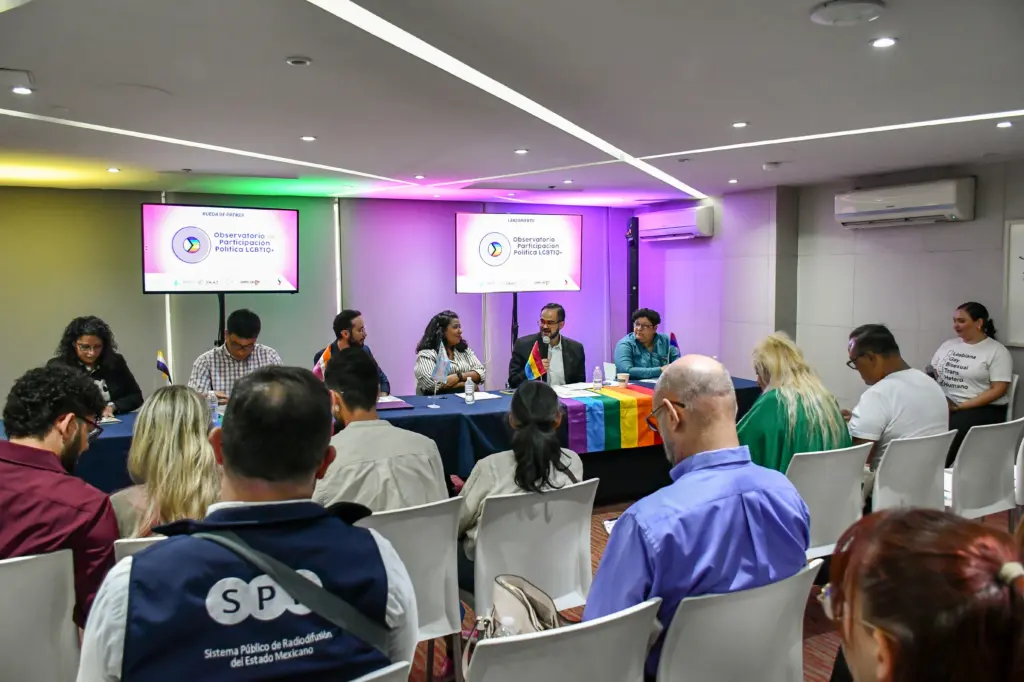
Victory Institute and regional partners at the announcement of the Regional Observatory on Political Participation of LGBTQI+ People in the Americas and the Caribbean.
LGBTQI+ political participation in the Americas is on the rise! With elections in nine countries across the continent, out and proud LGBTQI+ political leaders are hard at work on the campaign trail, defying obstacles and implementing innovative tactics. They are boldly changing how politics operates in their respective countries.
While these strides forward are cause for celebration, the global increase in anti-LGBTQI+ hate and discrimination in the political and electoral spheres threatens many. Too many out candidates still must grapple with the reality that excursing right to participate in the democratic process means taking a life-or-death risk. As we champion political victories, we must also confront the safety concerns that these candidates face – and that anti-LGBTQI+ forces thrust upon them.
In response to these challenges, LGBTQ+ Victory Institute, alongside our partners Caribe Afirmativo from Colombia, Yaaj Transformando tu Vida A.C. from Mexico, SOMOS CDC from Honduras, Diversidad Dominicana from Dominican Republic, Promsex, Centro de promocion y defensa de derechos sexuales y reproductivos from Peru, launched the Regional Observatory on Political Participation of LGBTQI+ People in the Americas and the Caribbean.

Senior Director of Global Programs Alhelí Partida speaks at the press conference.
This groundbreaking initiative aims to promote, visualize, and strengthen the political and civic engagement of LGBTQI+ people across the Americas and the Caribbean. Through meticulous data collection, the Observatory will shed light on the regional landscape, monitor the experiences of out LGBTQI+ candidates and track instances of political violence and threats to human rights.
The Observatory’s launch coincides with significant developments in the political arena. In Mexico, affirmative actions have guaranteed spaces for LGBTQI+ individuals within federal and local elections. However, tragic losses, including the murders of Ociel Baena, Samantha Fonseca and Miriam Rios, serve as stark reminders of the challenges faced by the community.

Ociel Baena.
Meanwhile, in Colombia, the 2023 territorial elections witnessed a historic surge in LGBTQI+ participation, with a notable 150% increase in candidacies compared to previous contests. The Dominican Republic have also seen remarkable progress, with LGBTIQ+ individuals securing elected positions and driving societal change.
In the last Peruvian elections, Susel Paredes, who is an out lesbian, received the most votes of any women. Despite this step forward, the country contains active anti-LGBTQI+ and anti-democracy forces. The recent decree that classifies trans population as “mentally ill” exemplifies this backwards trend.
In Honduras there is still intrenched discrimination. But recent appointments, such as Javier Carrington’s to the newly created role of Coordinator of Inclusion Policies in the federal Ministry of Social Development, signify positive steps towards political representation.
Together with our partner organizations, we seek to tell the stories of LGBTQI+ political leaders and shine a light on their experiences. To that end, the Observatory launched the “Survey on the Political Participation of LGBTQI+ People in Latin America and the Caribbean,” our effort to collect their stories. We have been encouraging LGBTQI+ leaders in the region to fill out the survey – and 4,760 individuals from 26 countries have done so!
We look forward to sharing the results of the survey – and the experiences of LGBTQI+ political leaders across the Americas. Follow the Observatory’s work on our website (www.liderazgosLGBT.com) and social media (@liderazgoslgbti)! Stay informed, stay empowered.

